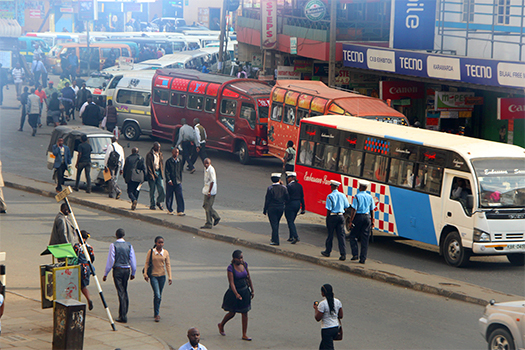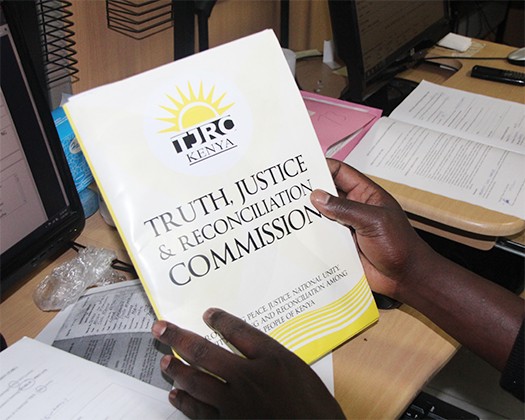On February 14, Kenyans once again confronted their painful relationship with law enforcement and revisited the deep mistrust born of historical abuses. In an unprecedented ruling, a court found five senior police officers potentially culpable in the gruesome death of a newborn baby who was clobbered to death in her parents’ home during the police response to the 2017 election protests. The court, following an inquest, ordered their prosecution. On the same day in a different part of the country, a senior police officer, Nashashon Mutua, was convicted of murder and jailed for life under a capital punishment sentence.
The coordinated response by the National Police Service, military branches, and general duty police to the Nairobi dusitD2 hotel attack on January 15 could be an indication that Kenya is committed to continued improvements since the West Gate Mall attack of 2013. Perhaps Kenya is now on better footing to consolidate the scattered security sector reforms that have been undertaken since the Ransley Taskforce on Police Reforms in 2009 and the enactment of the 2010 Constitution. During President Kenyatta’s final term, Cabinet Secretary Fred Matiangi has stewarded a number of reforms. However, given the fits and starts of the police vetting process over the past few years, victims’ advocates still have need for caution. Sensitive ongoing reform efforts have not achieved accountability for victims of rogue units or battalions of police accused of extrajudicial killings and horrific sexual and gender- based violence (SGBV), both in 2007 and 2017 general elections.
As a result, the real test is how the improved security forces will demonstrate a different understanding and commitment to the protection of the citizens’ human rights. The yet to be fully addressed post-electoral violence of 2007-2008 and the violence, abuse, and police violations in the 2017 general election demonstrate that state violence has long been used to fend off opposing political voices and protect those seeking to access or consolidate power. The impact of misconduct has been enormous.
Kenya’s courts are still sorting through some of the most horrendous acts of violations ever perpetrated on its soil, including extrajudicial executions, enforced disappearances, torture, and rape that took place over a decade ago. A case filed by victims of SGBV in 2007 demanding state responsibility and accountability has languished in court for six years as a result of judicial bottlenecks. A third judge is now set to hear the matter after two others were transferred midstream. In addition, the victims identified in the Kenya Truth Justice and Reconciliation Commission (TJRC) Report are still waiting for the Restorative Justice Fund to be established—an elusive goal due to hurdles mounted by state bureaucrats.
The ultimate goal of the reform agenda should be to prevent nonrecurrence of violations by security forces. The prospect of reform presents a very dicey situation to those in power who are expected to overhaul the very institution that perpetuates their power. But it is the only way forward if Kenya is to root out abuse and amend for the failures of the past.

Countries in Latin America, faced with similar dilemmas, phased out junta-led governance and professionalized their security sector and, as a result have become more inclusive and cohesive societies. To achieve economic stability and prosperity, the Kenyan political elite face a choice: either continue using security sector forces to bend the will of the electorate to their own benefit or strengthen security institutions enabling equal protection and, by extension, electoral freedoms and economic prosperity to take root. The president’s Building Bridges Initiative (BBI), which promises prosperity and economic development, must be buttressed by an honest reform of the security sector. This is a critical lynchpin.
As ICTJ argues in its forthcoming briefing paper on the subject, the use of the security sector for political mileage has gravely contributed to the loss of public trust. In the ongoing national dialogue, there is a need to hear the voices of excluded groups agitating for inclusion and to present genuine security sector reforms that can result in equal political freedoms. Through the grave human rights abuses by security forces—amounting to the collective punishment of marginalized communities—Kenya has worn out the public trust in their security sector and decayed its social fabric to the point of serious disrepair.
The Kenyan state must therefore seize any opportunity—such as the BBI—and reach out to the most excluded Kenyan communities to acknowledge and repair the harm done as a critical first step in rebuilding trust and relations with marginalized communities.
As we suggest in the paper, the state must also revisit reparations and outstanding commitments to implement the Restorative Justice Fund of 2015, spearhead genuine police vetting processes, deliver police accountability, and up the ante in the fight against corruption.
Kenya has shown capacity to learn from its past. The BBI Advisory Taskforce and the country’s political leadership should demonstrate courage by dusting off the TJRC report and other relevant historical records and starting a coherent, global reform effort. Engaging and including those communities that rather than being protected have been targeted by the state will also represent a meaningful form of accountability and reparation for the violations committed. This is an urgent first step to restore trust in Kenya’s public institutions.
PHOTO: The report of Kenya's Truth, Justice and Reconciliation Commission was released in 2013. (ICTJ)
